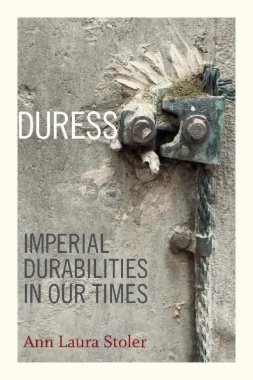How do colonial histories matter to the urgencies and conditions of our current world? How have those histories so often been rendered as leftovers, as "legacies" of a dead past rather than as active and violating forces in the world today? With precision and clarity, Ann Laura Stoler argues that recognizing "colonial presence" may have as much to do with how the connections between colonial histories and the present are expected to look as it does with how they are expected to be. In Duress, Stoler considers what methodological renovations might serve to write histories that yield neither to smooth continuities nor to abrupt epochal breaks. Capturing the uneven, recursive qualities of the visions and practices that imperial formations have animated, Stoler works through a set of conceptual and concrete reconsiderations that locate the political effects and practices that imperial projects produce: occluded histories, gradated sovereignties, affective security regimes, "new" racisms, bodily exposures, active debris, and carceral archipelagos of colony and camp that carve out the distribution of inequities and deep fault lines of duress today.
- Cover
- Contents
- Preface
- Appreciations
- Part I. Concept Work: Fragilities and Filiations
- 1. Critical Incisions: On Concept Work and Colonial Recursions
- 2. Raw Cuts: Palestine, Israel, and (Post)Colonial Studies
- 3. A Deadly Embrace: Of Colony and Camp
- 4. Colonial Aphasia: Disabled Histories and Race in France
- Part II. Recursions in a Colonial Mode
- 5. On Degrees of Imperial Sovereignty
- 6. Reason Aside: Enlightenment Projects and Empire’s Security Regimes
- 7. Racial Regimes of Truth
- Part III. “The Rot Remains”
- 8. Racist Visions and the Common Sense of France’s “Extreme” Right
- 9. Bodily Exposures: Beyond Sex?
- 10. Imperial Debris and Ruination
- Bibliography
- Index
- A
- B
- C
- D
- E
- F
- G
- H
- I
- J
- K
- L
- M
- N
- O
- P
- Q
- R
- S
- T
- U
- V
- W
- X
- Z

